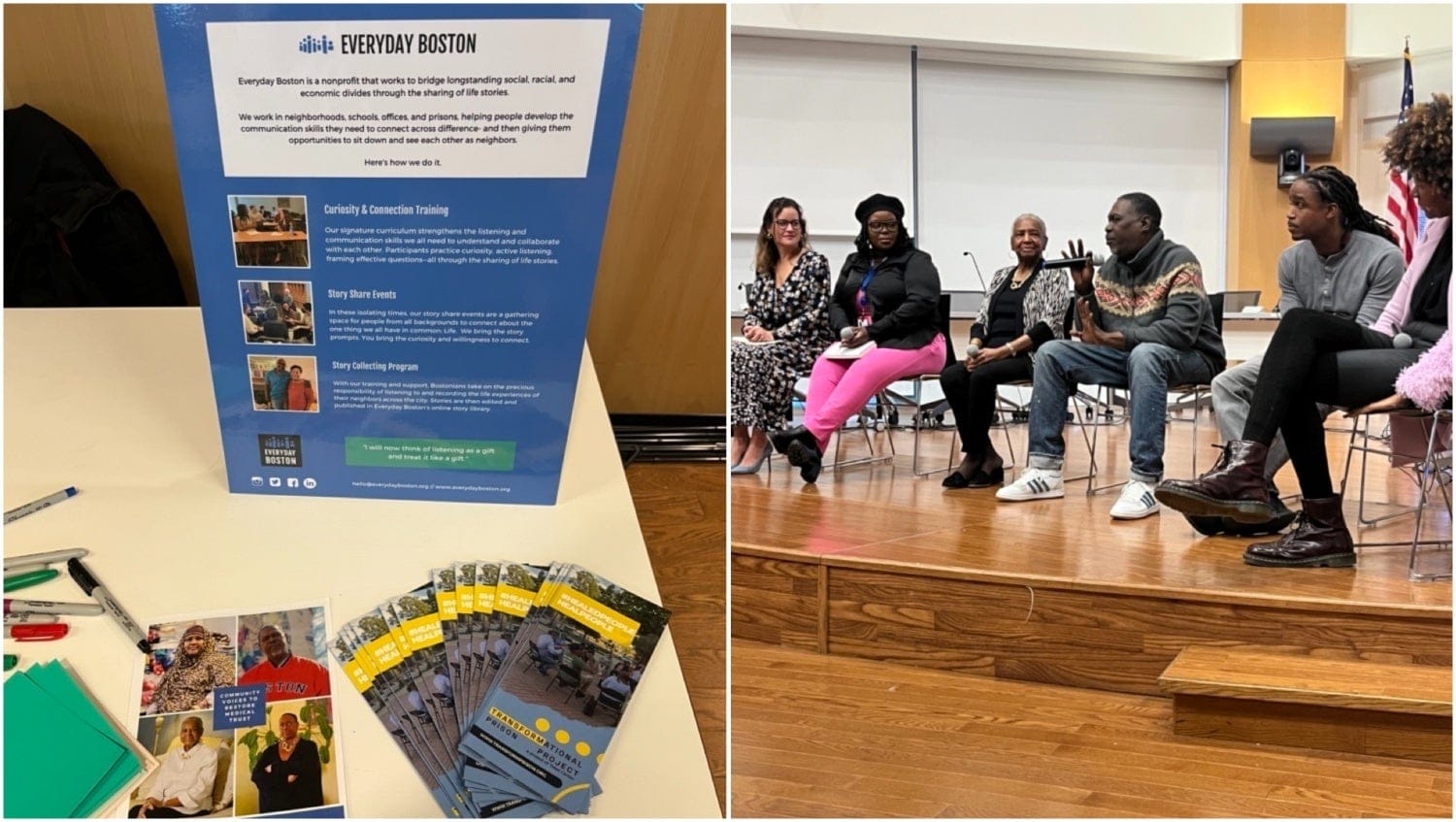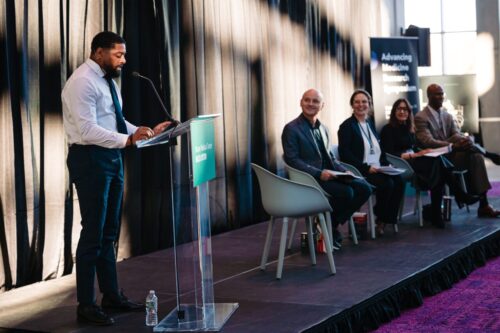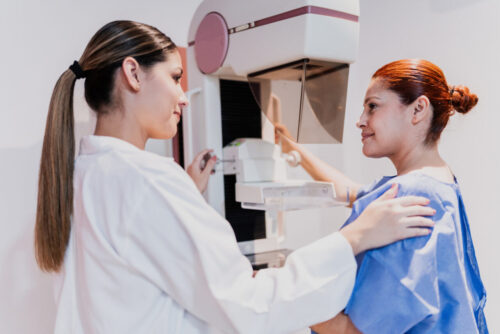"There Is Nothing More Powerful Than a Story": BMC Doc Shares Her Own Legacy of Medical Mistrust
April 25, 2023
By Katie Dillon

Boston Medical Center
(Left to right) Glory Ruiz, MD, Shaquera Robinson, MPH, Cheryl Harding, Tyrone Mack, Eric Anderson, and Nieisha Deed (Photo credit: Boston Medical Center)
A collaboration between Boston Medical Center and community groups shines a light on mistrust between marginalized groups and the healthcare system.
The healthcare system has a long history of failing and abusing communities of color through neglect or inhumane treatment. Just look at the Tuskegee experiment on Black men and the forced sterilization of Black women. Medical mistrust continues to permeate communities of color, particularly Black and Latino/a communities, with 56% of Black Americans citing at least one harmful medical experience, including having to speak up and advocate for adequate care.
In an effort to build trust and connection with the community, Boston Medical Center and its community partners have been working for more than two years on a project called Storytelling to Build Medical Trust. The project was designed to amplify the voices of Black and Brown people who have lived experience with bias in healthcare and activate healthcare providers to drive change. The work, initiated by BMC’s Katherine Gergen Barnett, MD, culminated this spring in Nubian Square with a visual display of the stories and a panel-style dialogue.
Storytelling to Build Medical Trust was jointly led by BMC, Everyday Boston, and The B.L.A.C Project, in partnership with Transformational Prison Project (TPP), We Got Us, EmVision, Boston University’s Clinical and Translational Science Institute and Massachusetts Community Engagement Alliance (MA-CEAL). The project focuses on highlighting the experience and wisdom of community members, who shared in video interviews their negative interactions with the healthcare system in the hope that the healthcare industry would finally listen. In addition to their stories, Gergen Barnett and Pablo Buitron de la Vega, MD, MSc, shared their own perspectives as healthcare providers working to build trust in the community.
The panel included Glory Ruiz, MD, from Boston Medical Center; Shaquera Robinson, MPH, from MA-CEAL; community leaders Tyrone Mack and Cheryl Harding; Eric Anderson from TPP; and Nieisha Deed Founder and CEO of PureSpark spoke.
The conversation eventually opened into an audience Q&A. An audience member asked Ruiz — a public health expert and community-focused physician who helped spearhead BMC’s COVID vaccine equity work — how the medical community is addressing misinformation and harm. She answered by telling her own story, an example of how the healthcare system failed her family and how she carries that legacy into her own approach to care.
Public health expert responds to how she is addressing misinformation and harm in medicine
“I think I need to answer your question with telling you a story about my earrings. These are my grandmother’s earrings and I’m wearing them today because they are a reminder of her and her presence.
To answer your question about what is the medical community doing? Not enough. I can tell you what I’m doing. What I’m doing is being here, making sure that I’m being present in these community dialogues, sharing my story not only as a Latina and in my language, but also making sure that I’m learning every day, including by making mistakes. I also want to put a name and a face to something that you don’t necessarily learn from a lecture or a textbook.
So here’s the story about my earrings.
My grandmother was sterilized at age 17 when there was a big campaign in Puerto Rico encouraging mass sterilization… Doctors were encouraged to sterilize women after their second delivery. Now why is this important? My grandmother had just had my uncle — she had my mom first and then my uncle second — and my grandfather was serving in the Korean War. The reason why this is important is because not only was she sterilized when she was a teenager, a young mom of course, but also while her husband was away. And these are the days where men needed to consent for their wives to get sterilized. So I am lucky to be here. And when you tell the story to people, it becomes not abstract but real.
This is my story. Our women lost all sort of authority or agency over their bodies. They altered the makeup of the Puerto Rican family structure in the ’50s and ’60s and for generations to come. We were experimented on. They ran the sterilization campaigns and birth control trials in the poorest Puerto Rican neighborhoods. …. This is not an abstract thing at all. This is what I’m doing: educating and sharing my grandmother’s story. And in that way I honor her. I make sure that I keep informing. And I take this from the abstract to the real because it’s shared humanity. There’s nothing more powerful than a story.”
By participating and sharing with the wider community surrounding BMC — not just the patients it serves — Ruiz and colleagues at BMC and beyond are working to build a healthier Boston where all residents can feel safe and heard engaging with the healthcare system. Watch more testimonials from patients sharing their stories here.


